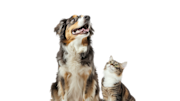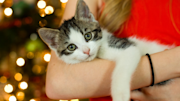
Pet insurance
5% pet insurance discount
Co-op members get a 5% discount on Co-op Pet Insurance each year. Subject to minimum yearly total costs of £51.59 for dogs and £50.68 for cats.

During the holiday season, your pets may not be at the forefront of your mind while you're wrapping presents, putting up decorations and trying to tidy the house before the family arrive.
But you won’t want to be spending Christmas Day at the vets if they'e eaten something toxic or swallowed a decoration.
With a little preparation and knowledge, you can prevent most of these mishaps. We've asked qualified vets Dr Rachel Sant, Dr Sue Dorey and Clinical Animal Behaviourist Rachel Rodgers from FirstVet for their advice.
Common dangers at Christmas include tinsel, lights, ribbons and strings on parcels, as well as candles, batteries and festive foods.
Keep your pets away from the Christmas tree or make sure that the lower branches are free from anything chewable (you'd be surprised what a dog or cat is prepared to chew on!).
Any presents containing food should be placed up high out of reach, or in a cupboard away from pets. Certain foods can cause more serious conditions than an upset stomach for cats and dogs.
The most dangerous foods for dogs include grapes, raisins and chocolate, as well as chewing gum or other sweets containing the sweetener xylitol.
Make sure that treats like mince pies and Christmas pudding are kept out of reach, as more than a single grape or raisin can lead to serious kidney damage in some dogs. Contact your vet straight away if your pooch eats more than one grape, raisin or sultana.
Chocolate is another no-no, but the danger depends on the type of chocolate and the size of your dog. The darker the chocolate, the higher the risk.
Other problematic foods include onions, leeks and garlic in large amounts, as well as fatty foods and bones. Bones can get stuck in your dog's throat or break pieces of enamel off their teeth when chewed.
Once you have thrown uneaten food out, secure it away from pets as certain moulds on decomposing food can be extremely toxic to them. It can cause tremors and seizures in some cases, even with very small amounts of mould.
Cats generally tend to be more sensible about the foods they choose, although sometimes will nibble on Christmas decorations, causing electrical burns and problems in their gut.
The most dangerous foods for your cat include chocolate, nuts or anything with grapes and raisins such as mince pies and Christmas pudding. Be mindful of any leftover carcass bones from your turkey, goose or chicken as these can make your cat unwell too.
Plants like mistletoe, holly and ivy can also upset your cat's stomach if ingested, licked or chewed. They may show signs such as drooling, vomiting, a reduced appetite or lethargy if they chew parts of these and eat them.
If you light candles or a fireplace over Christmas, be mindful that your four-legged friend could singe their fur if they get too close. Cats in particular love warmth and are attracted to the movement of bright, sparkly things, so be aware.
The same goes for your Christmas tree, which can be a temptation for your cat but also potentially dangerous if they attempt to climb it or knock ornaments off.
Your cat may also get entangled in wires and tinsel, or try to chew them. Try to plan what type of tree, decorations and lights might be safest, covering any wires with protective rubber or blocking access to them where possible.
Whether you own a dog or cat, having a first aid kit handy is a good idea over the festive period, as well as keeping some digestive food and probiotics in the house in case they get sick.
It's also important to make sure that your pet’s usual medications (if they are on any) will not run out over the holidays, as shops will shut at certain times.